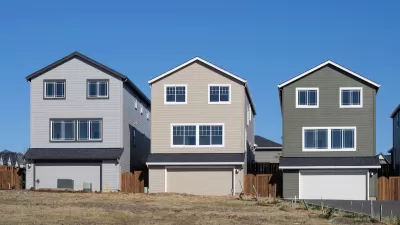A negative perception of manufactured housing persists, though the industry has changed drastically. Winton Pitcoff tells community developers that these homes need to be taken seriously as solutions for the affordable housing crisis.
"The thought of manufactured housing conjures up images of rows of trailer-homes on wheels, and that’s just what they were through the 1960s. The manufactured home industry has changed dramatically since then however."
"HUD regulations implemented in 1976 imposed construction and safety standards on manufactured housing that ultimately moved the industry away from metal-on-metal travel trailers to today’s factory-built frame homes that conform to the same building codes as, and look much like, site-built houses, with asphalt-shingled roofs and vinyl siding and windows. These houses can often be manufactured less expensively than comparable site-built houses, and with greater energy efficiencies."
"Manufactured housing makes up the largest stock of housing affordable to low- and moderate-income homebuyers in the United States. There are more manufactured housing units than the total number of public housing units and Section 8 vouchers combined."
"But while the problems of land-lease communities and chattel loans are real, the affordable housing field’s dismissal of manufactured housing demonstrated a lack of understanding of how far the manufactured housing sector had come toward being able to provide quality affordable housing."
FULL STORY: Maufacturing Solutions

Alabama: Trump Terminates Settlements for Black Communities Harmed By Raw Sewage
Trump deemed the landmark civil rights agreement “illegal DEI and environmental justice policy.”

Study: Maui’s Plan to Convert Vacation Rentals to Long-Term Housing Could Cause Nearly $1 Billion Economic Loss
The plan would reduce visitor accommodation by 25% resulting in 1,900 jobs lost.

Planetizen Federal Action Tracker
A weekly monitor of how Trump’s orders and actions are impacting planners and planning in America.

Wind Energy on the Rise Despite Federal Policy Reversal
The Trump administration is revoking federal support for renewable energy, but demand for new projects continues unabated.

Passengers Flock to Caltrain After Electrification
The new electric trains are running faster and more reliably, leading to strong ridership growth on the Bay Area rail system.

Texas Churches Rally Behind ‘Yes in God’s Back Yard’ Legislation
Religious leaders want the state to reduce zoning regulations to streamline leasing church-owned land to housing developers.
Urban Design for Planners 1: Software Tools
This six-course series explores essential urban design concepts using open source software and equips planners with the tools they need to participate fully in the urban design process.
Planning for Universal Design
Learn the tools for implementing Universal Design in planning regulations.
Caltrans
Smith Gee Studio
Institute for Housing and Urban Development Studies (IHS)
City of Grandview
Harvard GSD Executive Education
Toledo-Lucas County Plan Commissions
Salt Lake City
NYU Wagner Graduate School of Public Service




























